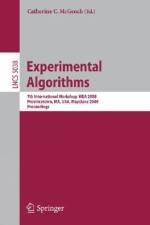- 7th International Workshop, WEA 2008 Provincetown, MA, USA, May 30 - June 1, 2008 Proceedings
von Catherine C. McGeoch
59,00 €
The Workshop on Experimental Algorithms, WEA, is intended to be an int- national forum for research on the experimental evaluation and engineering of algorithms, as well as in various aspects of computational optimization and its applications. The emphasis of the workshop is the use of experimental me- ods to guide the design, analysis, implementation, and evaluation of algorithms, heuristics, and optimization programs. WEA 2008 was held at the Provincetown Inn, Provincetown, MA, USA, on May 30 - June 1, 2008. This was the seventh workshop of the series, after Rome (2007),Menorca(2006),Santorini(2005),RiodeJaniero(2004),Asconia(2003), and Riga (2001). This volume contains all contributed papers accepted for presentation at the workshop. The 26 contributed papers were selected by the Program Committee onthebasisofatleastthreerefereereports,somecontributedbytrustedexternal referees. In addition to the 26 contributed papers, the program contained two invited talks. Camil Demetrescu, of the University of Rome "e;La Sapienza,"e; spoke on "e;Visualization in Algorithm Engineering."e; David S. Johnson of AT & T Labs - Research, gave a talk on "e;Bin Packing: From Theory to Experiment and Back Again."e; We would like to thank the authors who responded to the call for papers, our invited speakers, the members of the ProgramCommittee, the external referees, and the Organizing Committee members for making this workshop possible.



